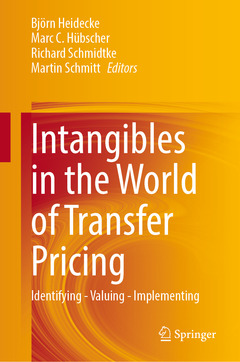Intangibles in the World of Transfer Pricing, 1st ed. 2021 Identifying - Valuing - Implementing
Coordonnateurs : Heidecke Björn, Hübscher Marc C., Schmidtke Richard, Schmitt Martin

Intangible assets are becoming increasingly important as value drivers for multinational companies. It is a strategic question how to allocate intangibles within the multinational corporation. It needs to be defined by whom and under which conditions they can be utilized. Typical IP migration models such as licensing, joint development and transferring are becoming a focal point within tax audits across the globe. Hence,defining an intangibles system that fulfils the tax requirements is of utmost strategic importance for multinational corporations. A central question is how to value intangibles in line with the arm?s length principle as is required internationally for transfer pricing purposes.
Edited by leading transfer pricing and valuation experts in Europe, this comprehensive book offers practitioners an effective road map for identifying, valuing and implementing intangibles for transfer pricing purposes under consideration of both the OECD and local perspectives. It is therefore a must-have book for transfer pricing and valuation practitioners on all levels of experience.The book starts with an introduction to the role of intangibles in the world of transfer pricing including typical intangibles migration models. It describes common intangible assets across all types of industries, including e.g. automotive, consumer goods and software.Using several numerical examples, the book then covers state-of-the-art valuation methods including how to apply these methods in practice in a way consistent with the OECD Transfer Pricing Guidelines. The different country chapters written by local experts provide country-specific guidance on the legal framework concerning intangible assets from a transfer pricing and valuation perspective. Finally, the book covers practical advice on the implementation of an intangible assets system.
This book offers invaluable guidance to practitioners seeking tools to apply the arm?s length principle in theworld of intangibles.
Dr. Björn Heidecke studied Economics (Diploma) and Vocationomics (Diploma) at Kiel University. He holds a PhD in economics from Chemnitz University. Björn is a Transfer Pricing Director with Deloitte Germany (Hamburg) with a focus on intangible assets transactions, business model optimizations, profit splits and economic modeling. He develops tax and transfer pricing learnings in-house and for multinational. He publishes frequently in national and international Journals on Transfer Pricing and related matters. He is co-editor on a handbook on Transfer Pricing and Relocation of Functions. He is an alumnus of the Hanns Martin Schleyer foundation and a member of the Deutsche Gesellschaft für ökonomische Bildung. Björn teaches Transfer Pricing at the Internal University of the German Tax Authorities.
Dr. Marc C. Hübscher studied Business Administration (Diploma) and Vocationomics (Diploma) at Oldenburg University. He holds a PhD in economics from Oldenburg University. Marc isa Partner with Deloitte Germany (Hamburg) in the Financial Advisory team responsible for Valuation and Modeling. His expertise comprises business valuation and business modeling, valuation of intangible and tangible assets, purchase price allocations as well as modeling of integrated corporate planning tools for both strategic and financial investors. He has advised clients at the interface of transfer pricing and valuation. He publishes frequently on valuation as well as business ethics and co-edits the German Journal for Business Ethics. Marc teaches controlling and leadership at the University of Ulm as well as Göttingen and holds memberships of the Verein für Socialpolitik and the Deutsche Gesellschaft für Philosophie.
Dr. Richard Schmidtke studied economics (Diploma) in Munich and Toulouse and holds a PhD in economics from the University of Munich. Furthermore, he holds a Master in Accounting and Taxation from the Business School Mannheim and is a CFA Charterholder. Richard i
Date de parution : 01-2021
Ouvrage de 723 p.
15.5x23.5 cm



